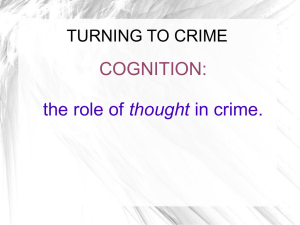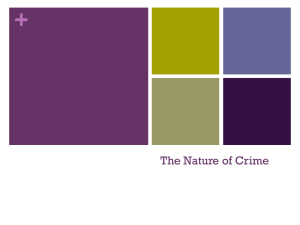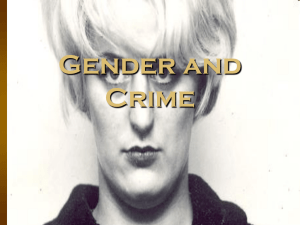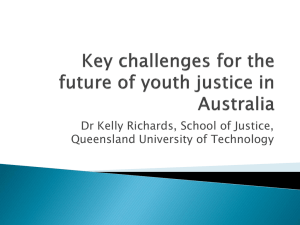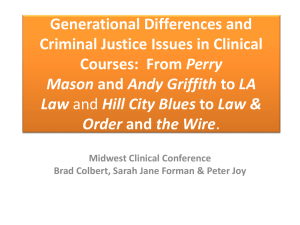Criminal Law
advertisement
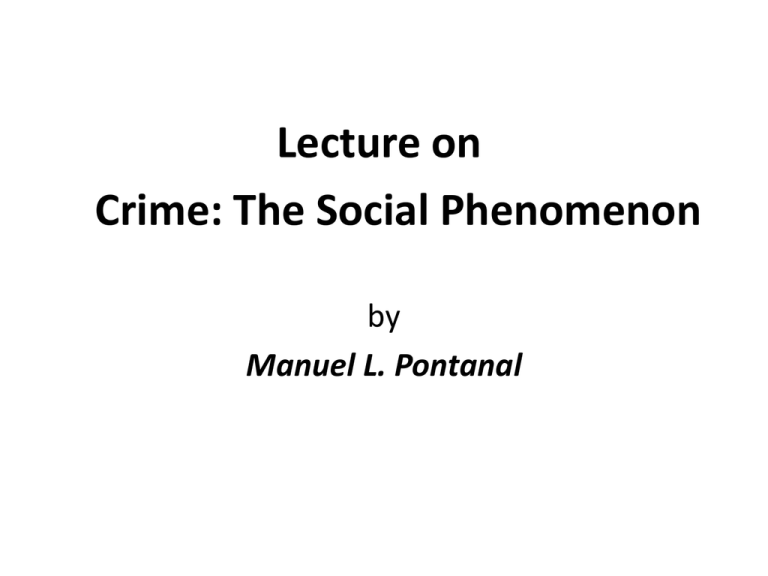
Lecture on Crime: The Social Phenomenon by Manuel L. Pontanal “Learn as if you were to die tomorrow. Learn as if you were to live forever.” Atty. Mahatma Gandhi Crime is an act committed or omitted in violation of a public law forbidding or commanding it. (Bouvier’s Law Dictionary, Rawle’s third revision, 729). Criminal Law is that branch or division of law which defines crimes, treats of their nature, and provides for their punishment (12 Cyc. 129). Social Phenomenon include all behavior which influences or is influenced by organisms sufficiently alive to respond to one another. (http://en.wikipedia.org/wiki/Social_phenomena) CRIMINAL LAW AND THE NATURE AND EXTENT OF CRIME Criminal law dictates what constitutes a crime and how criminal acts are defined. Today’s criminal law incorporates historical traditions, moral beliefs, and social values, as well as political and economic developments and conditions. Criminal law is a living concept, constantly changing to keep pace with society. Two Theories in Criminal Law Classical Theory 1. the basis of criminal liability is human free will and the purpose of the penalty is retribution. 2. that man is essentially a moral creature with an absolutely free will to choose between good and evil, thereby placing more stress upon the effect or result of felonious act than upon the man, the criminal himself. 3. it has endeavored to establish a mechanical and direct proportion between crime and penalty. 4. there is a scant regard to the human element. by the Code Commission on Code of Crimes) (Basic Principles, Rationale, p.2. Positivist Theory 1. That man is subdued occasionally by a strange and morbid phenomenon which constrains him to do wrong, in spite of or contrary to this volition. 2. That crime is essentially a social and natural phenomenon, and as such, it cannot be treated and checked by the application of abstract principles of law and jurisprudence nor by the imposition of a punishment, fixed and determined a priori; but rather through the enforcement of individual measures in each particular case after a thorough, personal and individual investigation conducted by a competent body of psychiatrists and social scientists. FUNCTIONS OF CRIMINAL LAW (1) Enforcing Social Control – The primary purpose of criminal law is to control the behavior of people within its jurisdiction. Criminal law is a written statement of rules to which people must conform – the universally followed behavior is referred to as the mores or serious norms The folkways are the unwritten rules of conduct, such as customs and conventions Those in political power rely on criminal law to formally prohibit behaviors believed to either threaten societal well-being or challenge their own authority. (2) Deterring Criminal Behavior – criminal law has a social control function to control, restrain, and direct human behavior through its ability to punish and correct law violations. The threat of punishment associated with violating the law is designed to prevent crimes before they occur. (3) Maintaining Social Order – all legal systems are designed to support and maintain the boundaries of the social system they serve. (4) Discouraging Revenge – By delegating enforcement to others, criminal law controls an individual’s need to seek revenge or vengeance against those who violated his or her rights. (5) Expressing Public Opinion and Morality – criminal law reflects constantly changing public opinions and moral values. Criminal law has the power to define the boundaries of moral and immoral behavior has proven difficult to legally control public morality because of the problems associated with gauging the will of the majority; respecting the rights of the minority; and enforcing laws that many people consider trivial or self-serving. (6) Punishing Wrongdoing – the deterrent power of criminal law is tied to the authority it gives the state to sanction or punish offenders. Those violating mores and folkways can receive social disapproval, whereas criminal law violators are subject to physical coercion and punishment. Criminal law is society’s instrument of punishment; it serves as a measure of the public’s idea of right and wrong. Power to Define and Punish Crimes • The state has the authority, under its police power, define and punish crimes and to lay down the rules of criminal procedure. States, as apart of their police power, have a large measure of discretion in creating and defining criminal offenses. (People vs. Santiago, 43 Phil. 120) • The right of prosecution and punishment for a crime is one of the attributes that by a natural law belongs to the sovereign power instinctively charged by the common will of the members of society to look after, guard and defend the interests of the community, the individual and social rights and liberties of every citizen and the guaranty of the exercise of his rights. (U.s. vs. Pablo, 35 Phil.94) (The Revised Penal Code –Criminal Law by Luis B. Reyes) Limitations on the Power of the Lawmaking Body to Enact Penal Legislation The Bill of rights of the 1987 Constitution imposes the following limitations: 1. No ex post facto law or bill of attainder shall be enacted. (Art. III, Sec. 22) 2. No person shall be held to answer for a criminal offense without due process of law.(Art. III, Sec. 14 [1]) • The first limitation prohibits the passage of retroactive laws which are prejudicial to the accused. • The second limitation requires that criminal laws must be of general application and must clearly define the acts and omissions punished as crimes. • Congress is also prohibited from passing an act which would inflict punishment without judicial trial, for that would constitute a bill of attainder. Its essence is the substitution of a legislative act for a judicial determination of guilt. (People vs. Ferrer, 48 SCRA, 382) (The Revised Penal Code –Criminal Law by Luis B. Reyes) Ex Post Facto Law An ex post facto law is one which: 1. makes criminal an act done before the passage of the law and which was innocent when done, and punishes such an act; 2. aggravates a crime, or make it greater than it was, when committed; 3. changes the punishment and inflicts a greater punishment than the law annexed to the crime when committed; 4. alters the legal rules of evidence, and authorizes conviction upon less or different testimony than the law required at the time of the offense. 5. assumes to regulate civil rights and remedies only, in effect imposes penalty of deprivation of a right for something which when done was lawful; and 6. deprives a person accused of a crime some lawful protection to which he has become entitled, such as the protection of a former conviction or acquittal, or a proclamation of amnesty. (In re: Kay villegas Kami Inc., 35 SCRA 429) (The Revised Penal Code –Criminal Law by Luis B. Reyes) Characteristics of Criminal Law Criminal law has three main characteristics: (1) general, (2) territorial, and (3) prospective. General, in that criminal law is binding on all persons who live or sojourn in Philippine territory. (Art. 14, New Civil Code) Territorial, in that criminal laws undertake to punish crimes committed within the Philippine territory. Prospective, in that a penal law cannot make an act punishable when committed in a manner in which it was not punishable when committed. (The Revised Penal Code –Criminal Law by Luis B. Reyes) Three (3) Classes of Crimes In the Philippines, there three (3) classes of crimes. The Revised penal Code penalizes the first two classes of crimes, (1) intentional felonies, and (2) the culpable felonies. The third class of crimes are those (3) defined and penalized by special laws which include the municipal or city ordinances. Crimes Penalized by the Revised Penal Code Acts or omissions punishable by law are felonies (delitos). Felonies are committed not only by means of deceit (dolo) but also by means of fault (culpa). There is is deceit when the act is performed with deliberate intent; there is fault when the wrongful act act results from imprudence , negligence, lack of foresight, or lack of skill (Article 3, RPC). Elements of felonies 1. There must be an act or omission. 2. The act or omission must be punishable by the Revised penal Code. 3. The act is performed or the omission is incurred by means of deceit or fault. Classification of Felonies according to the Means by which they are Committed (1) “Intentional felonies”, the act or omission of the offender is malicious. The act is performed with deliberate intent. The offender in performing the act or in incurring the omission, has the intention cause an injury to another. (2) “Culpable felonies”, the act or omission of the offender is not malicious. The injury caused by the offender to another person is “unintentional”, it being simply the incident of another act performed without malice. (People vs. Sara, 55 Phil. 939) As stated in Art. The wrongful act results from imprudence, negligence, lack of foresight or lack of skill. (The Revised Penal Code –Criminal Law by Luis B. Reyes) Requisites of Malice In order that the act or omission may be considered as having been performed or incurred with deliberate intent, the requisites must concur: 1. He must have FREEDOM while doing the act or omitting the to do an act. When a person acts without freedom, he is no longer a human being but a tool. Thus, a person who acts under the compulsion of an irresistible force is exempt from criminal liability. (Art. 12, par. 5). So, also, a person who acts under the impulse of uncontrollable fear of an equal or greater injury is exempt from criminal liability. (Art. 12, par. 6) 2. He must have INTELLIGENCE while doing the act or omitting to do the act. Without this power, necessary to determine the morality of human acts, no crime can exist. Thus, the imbecile or the insane, and a child fifteen (15) years old and below, have no criminal liability. (Art. 12, pars. 1,2). 3. He must have INTENT while doing the act or omitting to do an act. Intent to commit the act with malice, being purely a mental process, is presumed and the presumption arises from the proof of the commission of an unlawful act. All the three requisites of voluntariness in intentional felony must be present, because “ a voluntary act is free, intelligent, and intentional act.” (U.S. vs. Ah Chong, 15 Phil. 488) Intent is not required in Crimes Punished by Special Laws • Crime punished by a special law, as a general rule, intent to commit is not necessary. It is sufficient that the offender has the intent to perpetrate the act prohibited by the special law. • Intent to commit the crime and intent to perpetrate the act must be distinguished. A person may not have consciously intended to commit a crime; but he did intend to commit an act, and that act is, by the very nature of things, the crime itself. (U.S. vs. Go Chico, 14 Phil. 128) • In the first (intent to commit the crime), there must be criminal intent; in the second 9intent to perpetrate the act), it is enough that the prohibited act is done free and consciously. (The Revised Penal Code –Criminal Law by Luis B. Reyes) Meaning of Words and Phrases • “act” must be understood any bodily movement tending to produce some effect in the external world, it being unnecessary that the same be actually produced, as the possibility of its production is sufficient. • “omission” is an inaction, the failure to perform a positive duty which one is bound to do. There must be a law requiring the doing or performance of an act. • “Punishable by law” is based on the maxim that there is no crime where there is no law punishing it. The phrase “punished by law “ should be understood to mean” punished by the “Revised Penal Code” and not by a special law. That is to say the term “felony” means the acts and omissions punished by the Revised penal code, to distinguish it from the words “crime” and “offense” which are applied to infractions of the law punished by a special statutes. • “Imprudence” indicates deficiency of action. If a person fails to take the necessary precaution to avoid injury to person or damage to property, there is imprudence. Imprudence involves lack of skill. • “Negligence” indicates a deficiency of perception. If a person fails to pay proper attention and to use due diligence in foreseeing the injury or damage impending to be caused, there is negligence. Negligence usually involves lack of foresight. Citation: The Revised Penal Code –Criminal Law by Luis B. Reyes What do criminologists mean when they say the crime is a "social phenomenon"? Why is this significant? The two major schools of thought about why crime exists, and therefore society should know how to prevent it, are psychological and sociological. • The psychological school believes that a criminal temperament grows out of childhood experiences or chemical imbalances, and therefore crime prevention should concentrate tendencies. on those individuals with “criminal” • The second school maintains that social conditions poverty, racial prejudice, inadequate schools, etc. - have as their natural consequence criminal behavior as an inevitable response to social injustices -- the social phenomenon. Their solutions, then, revolve around improving social conditions. HOW CRIMINOLOGISTS VIEW CRIME • The Consensus View of Crime – crimes are behaviors believed to be repugnant to all elements of society; implies general agreement among a majority of citizens on what behaviors should be prohibited by criminal law and viewed as crimes; function of beliefs, morality, and rules established by the existing legal power structure; laws apply to all citizens equally. • The Conflict View of Crime – the definition of crime is controlled by wealth, power, and position; crime is a political concept designed to protect the power and position of the upper classes at the expense of the poor. • The Interactionist View of Crime – the definition of crime reflects the preferences and opinions of people who hold social power in a particular legal jurisdiction; these people use their influence to impose their definition of right and wrong on the rest of the population; criminals are individuals that society labels as outcasts or deviants because they have violated social rules. See criminal law as conforming to the beliefs of “moral crusaders” or moral entrepreneurs who use their influence to shape the legal process as they see fit; Concerned with shifting moral and legal standards; Crime has no meaning unless people react to it. “He who does not prevent a crime when he can, encourages it.” Seneca Thank You




